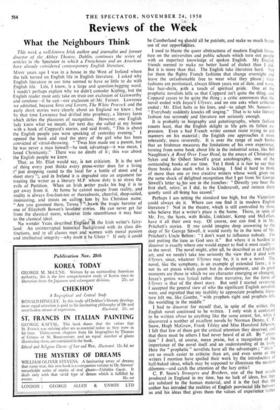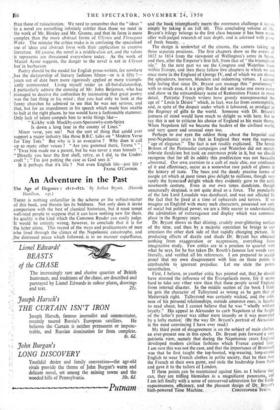Reviews of the Week
What the Neighbours Think
This week a well-known Irish author and journalist and former director of the Abbey Theatre, Dublin, continues the series of articles in the Spectator in which a Frenchman and an American have already considered contemporary English literature.
MANY years ago I was in a house in the West of Ireland where the talk turned on English life in English literature. I asked why English literature in our time seemed to have so little to do with English life. Life, I know, is a large and question-begging word. I needn't perhaps explain Why We didn't consider Kipling, but the English reader must only take on trust our exclusion of Galsworthy and condone—if he can—our exclusion of■Mr. Forster. Lawrence we admitted, because Sons and Lovers, The White Peacock and the early short stories were clearly about an England we knew ; but by that time Lawrence had drifted into prophecy, a literary form which defies the pleasures of recognition. However, one English lady knew what we meant, for next day she called at my house with a book of Coppard's stories, and said firmly, "This is about the English people you were speaking of yesterday evening." I opened the book and read the story of the girl who has been convicted of vitriol-throwing. " Twas him made me a parent, but he was never a man himself—he took advantage—it was mean, I loved Christianity." There was no doubt of it ; this was about the English people we knew.
That, as Mr. Eliot would say, is not criticism. It is the sort of thing every poet thinks every prose-writer does for a living (" just dropping round to the local for a bottle of stout and a short story "), and in Ireland it is degraded into an argument for treating the writer as a literary M.P. whose duty is to stress the evils of Partition. When an Irish gieriter packs his bag it is to get away from it. At home he cannot escape from reality, and reality is always five-foot-ten or thereabouts, cheerful, shop-soiled,- insinuating, and insists on calling-, him by his Christian name. "Are you gummed there, Teresa'? "--....bawls the tragic heroine of one of Elizabeth Bowen's lovelitst stdries. He can never get far from the classical norm, whatever little resemblance it may bear to the classical ideal. No wonder Yeats described. EngltdN the Irish writer's fairy- land. An uninterrupted historical ckgfcund with its class dis- tinctions, and in all classes men and -women with moral passion and intellectual integrity—why muk it be Ulster ? If only it could be Cumberland ws should all be patriots, and make so much better use of our opporru4ities.
I used to blame the queer abstractness of modern English litera- ture on the universities and public schools which turn out people with an imperfect knowledge of spoken English. My English friends seemed to make no better hand of dialect than I did, But it is more than that. The English take literature hard. Not for them the flighty French fashions that change overnight and leave the unfashionable free to wear what they please ; their fashions are puritanical, always fifteen years out of date, and worn, like hair-shirts, .with a touch of spiritual pride. One of the prophetic novelists tells us that Coppard isn't quite the thing, and Coppard ceases to be quite the thing ; a critic announces that. the novel ended with Joyce'' Ulysses, and no one asks when criticism ended ; Mr. Eliot halts in his lines, and—to adapt Mr. Sassoon- " Everybody suddenly knocks off singing.' That is to take literary fashion too seriously and literature not seriously enough. It is probably in biography and autobiography, where fashion counts least, that the English delight in life gets its fullest ex- pression. Even a bad French writer cannot resist trying to put manners on his material ; the English one approaches it more tolerantly, more reverently. It is over the range of such books that an Irishman measures the limitations of his own experience, turning from some book about life in the industrial areas, like Bill Naughton's A Roof Over Your Head, to the essays of Christopher Sykes and Sir Osbert Sitwell's great autobiography, one of the outstanding books of our time. Yet I think it is fair to say that these books also mark what is lacking. I find it hard' to think of more than one or two creative writers whose work gives me the same shock of delighted recognition that I get from Sir George Sitwell's letter to .his son in the ,trenches: "Directly you hear the first shell, retire, as I did, to the Undercroft, and remain there quietly until all-firing has ceased."
Perhaps I am-setting the standard too high, but the Victorians could always do it. Where can one find it in modern English literature ? Not' in the theatre, which is still controlled by those who believe that a writer's place is the home. There, in spite of Mr. Fry, the Scots, with Bridie, Linklater, Kemp and McLellan, have it all their own way. Of course, one can find it in Mr. Pritchett's stories. It one could imagine deep answering to the deep of Sir George Sitwell, it would surely be in the tone of Mr. Pritchett's Uncle Belton: "I don't want to influence nobody. I'm just putting the 'ease as God sees it." But where it is hardest to discover is exactly where one would expect to find it most readily— in the novel. The novel might, after all, be described as an English art, and we needn't take too seriously the view that it died with Ulysses, since, whatever Ulysses may be, it is not a novel. The novel, like the symphony, is an example of extended form ; it is not its set pieces which count but its development, and its great moments are those in which we see character emerging or changing. Joyce's genius was lyrical rather than narrative, for the form of' Ulysses is that of the short story. But until I started reviewing I accepted the general view of who the significant English novelists were, and regretted that my inability to appreciate prophetic litera- ture left me, like.Goethe, "with prophets right and prophets left, the worldling in the middle." I had to discover for myself that, in spite of the critics, the English novel continued to be written. I only wish it continued to be written about to anything like the same extent, for, while I discovered a number of excellent novels by Norman Denny, C. P. Snow, Hugh McGraw, Frank Tilsley and Miss Hansford Johnson, I felt that few of them got the critical attention they deserved, and that there must be others I had never heard of at all. By " atten- -tion " I don't, of course, mean praise, but a recognition of the importance of the novel itself and an understanding of its form. Here the " prophetic " novelists have all the advantages ; "ideas are so much easier to criticise than art, and even some of the writers I mention have spoiled their work by the introduction of half-baked ideas, which may be supposed to illuminate the modern dilemma—and catch the attention of the lazy critic! C. P. Snow's Strangers and Brothers, one of the best novels produced in England in my time, has no lack of ideas, but they are subdued to the human material, and it is the fact that the author has intruded the realities of English provincial,life betweell us and his ideas that gives them the values of experience rather . than those of ratiocination. We need to remember-that the " ideas " . in a novel are something infinitely subtler than those we meet in .! 'the work of Mr. Huxley and Mr. Greene, and that its form is more complex than the more abstract forms of Ulysses. and Flanegans . Wake. The mistake the critics' make is in confusing the specialised use of ideas and abstract form with their application to creative : literature. Of course, the novel is a middle-class art, and the values it represents are threatened everywhere today. As the work of Marcel Ayme suggests, the danger to the novel is not in Ulysses • . but in barbarism Poetry should be the model for English prose-writers, for nowhere Alms the dictatorship of literary fashions fifteen—or is it fifty ?— , .years out of date been more rigorously applied or more triumph- .: antly surmounted Living myself under an all-but-dictatorship, ; particularly admire the cunning of Mr. John Betjeman, who has ! .managed to deceive the authorities by insinuating that great poetry was the last thing in his mind ; that you had only to look at the :funny churches he admired to see that he was not serious, and :that, but for an impediment in his speech which made' him unable halt at the right places, he too would have .a fashionable stammer. : Only lack of talent compels him to write things like- " Kirkby with Muckby-cum-Sparrowby-cum-Spinx Is down a long lane in the county of Lincs." Minor verse, you see! Not the sort of thing that cOuld ever :support a major industry like those. B.B.C. talks on " Moderil Verse -for Tiny Tots." But why is it so evocative ? Why does it call • up so many other voices ? "Are you gummed there, Teresa 9 " ; "'Twas him made me a parent, but he was never a man himselt ; :" Directly you hear the first shell; retire,. as I did, to the Under- . croft " ; "I'm just putting the case as God sees it." • Is it perhaps that it's life ? Not even English life—just life ?
FRANK O'CONNOR.















































































 Previous page
Previous page